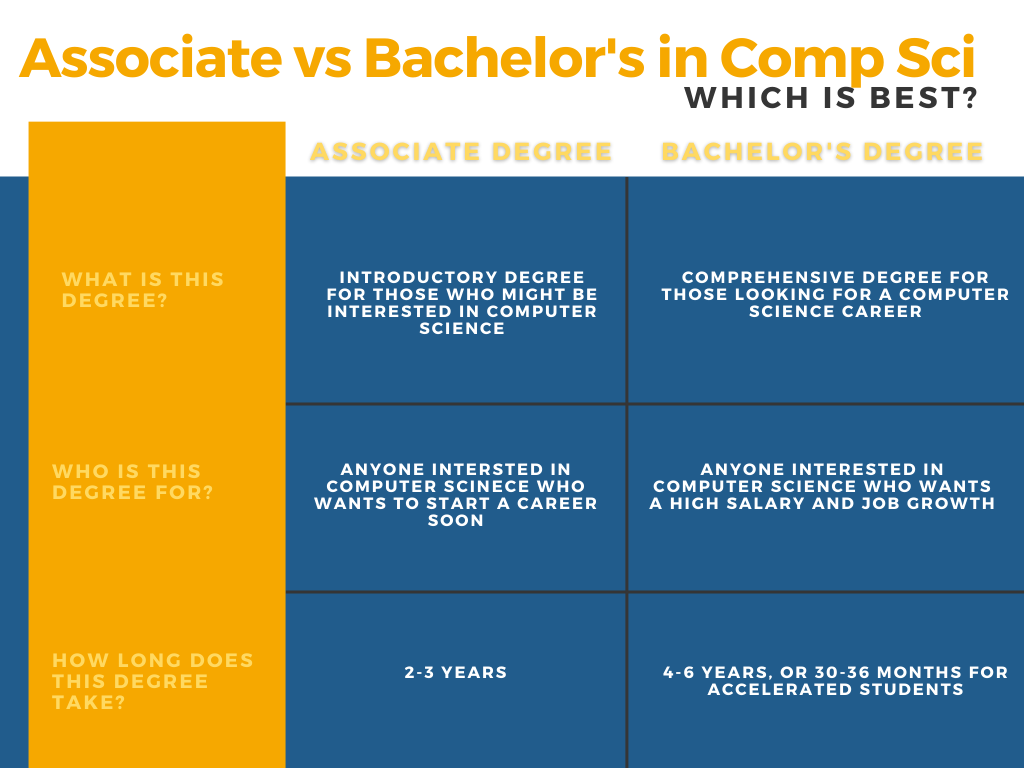It might be challenging to decide whether to pursue an associate’s degree or a bachelor’s degree in college. Your degree program should be in line with your long-term financial, professional, and personal objectives.
Difference Between the Associate Degree vs Bachelor Degree
- Associate Degree: For an associate degree (technical or occupational degree), classes typically educate you for a certain vocation. The credits you acquire toward an associate’s degree may occasionally be transferred toward a bachelor’s degree, and you can also enroll in general studies (non-occupational degrees).
- Bachelor’s Degree: You will need to finish a program with about 120 credits of study to earn a bachelor’s degree. In many professions, such as architecture, chemistry, or mathematics, a bachelor’s degree is regarded as an entry-level qualification. Frequently, “general education” classes in subjects like history, fine arts, sciences, arithmetic, and English are necessary. Several elective courses that are intended to further your chosen field may be required of you.
Point of Differences
Program length, program concentration, earning potential, program costs, and career options are the main distinctions between an associate degree and a bachelor’s degree:
- Program Length: The majority of full-time associate degrees take two years to complete, whilst the majority of full-time bachelor’s degrees take four years.
- Programme Focus: Because bachelor’s degrees require more coursework than an equivalent associate degree, they typically cover a particular topic of study in greater depth.
- Earning Potential: People with bachelor’s degrees make an average of $19,000 more a year than people with associate degrees.
- Program costs: Because a bachelor’s degree requires more coursework than an associate degree, it usually costs more to complete the program.
- Opportunities for Employment: Obtaining a bachelor’s degree often leads to more employment possibilities.
How valuable is an associate’s degree?
For students who haven’t decided on a career path or are still weighing their options, associate degrees are the best solution. A variety of liberal arts areas are covered in programs with a general studies emphasis, including literature, communication, art, history, humanities, philosophy, psychology, computer science, and more.
Additionally, these degrees are a great option for individuals who are unable to enroll in a particular or prestigious university due to their poor high school performance or low SAT scores. The claimed students’ academic achievement can be revised with the aid of an associate degree.
FAQ
1. Are associate degrees superior to bachelor’s degrees?
The median weekly wages of bachelor’s degree holders are $337 greater than those of associate degree holders, according to the Bureau of Labour Statistics. Although an associate degree may be sufficient for entry-level employment, it is important to keep in mind that promotions or other professional advancements may call for further study.
2. Do two associate degrees add up to a bachelor’s degree?
The same rigor is not offered by associate degrees. But ultimately, no, earning two associate degrees does not equal earning a bachelor’s degree. Since associate degrees are equivalent to the first two years of a bachelor’s degree, they are deficient in upper-division courses, capstone projects, theses, etc.
3. What distinguishes an associate’s degree from a diploma?
Diplomas typically cover a specific set of abilities and can be earned in a shorter amount of time. In contrast, associate degree programs often run longer and cover more ground, imparting knowledge of both the academic and practical abilities needed for a particular field.
4. What do you call a four-year degree?
Bachelor’s degree programs, which are intended to be finished in 4 years, offer in-depth information and abilities across a wide range of professional options to help you stand out in today’s cutthroat labor market. The demand for bachelor’s degrees is great.
Time for Decision
Choosing a degree path is an individual decision that demands careful thought and reflection. A fascinating fact is that people typically have distinct motivations for selecting an associate program over a bachelor’s program. Cost and location are two common factors considered while selecting an associate program. You might also want to think about some creative ways to approach your choice.

